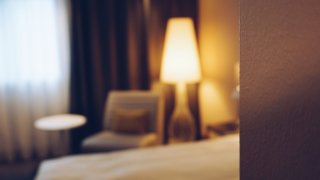
NBC10 is one of dozens of news organizations producing BROKE in Philly, a collaborative reporting project on solutions to poverty and the city’s push toward economic justice. Follow us at @BrokeInPhilly.
Philadelphia has run out of federal funding used to house at-risk homeless people in a hotel during the coronavirus pandemic, the city says.
Now, about 200 residents are being moved from the hotel Dec. 15 to unspecified other sites while case managers work to move them into long-term affordable housing. The city told residents in a letter that the hotel would soon return to serving customers.
People at risk of catching the coronavirus were moved into the Holiday Inn on Walnut Street and other sites where the city rented out several rooms near the end of March, when cases were rising ahead of a spring peak.
Get Philly local news, weather forecasts, sports and entertainment stories to your inbox. Sign up for NBC Philadelphia newsletters.
The city rent agreement with the Holiday Inn was for $175,000 a month and $119,000 a month for the Fairfield Inn on 13th and Spruce Streets, officials said at the time. The city paid the bills with federal coronavirus relief funds.
An agreement with another hotel near the airport was ended quickly after the city said there was no need. But the COVID Prevention Sites at the Holiday Inn and the Fairfield Inn continued, and hosted several people who were previously living on the streets. Rooms were given to people over 65 or who had underlying health conditions.
20 people from the homeless encampments on the Benjamin Franklin Parkway and near the Philadelphia Housing Authority headquarters were placed in the hotels this summer, organizer Jennifer Bennetch said.
In September the city reached an agreement with the camps earlier this year after a monthslong stalemate. Campers stayed put for months, saying they had wanted to try something new after months or years bouncing from shelter to shelter.
Shelters in the city, many of which are run by nonprofits, help many people in need. But some who've stayed in shelters have had issues with restrictions on smoking, pet ownership, or just not getting along with residents or people in charge.
Activists protested outside the inn on multiple days this week, characterizing the city as evicting vulnerable people during a pandemic and demanding the residents be allowed to stay.
"I’m concerned that this is coming at the same time as we’re seeing a massive spike in COVID," said Stephanie Sena, an anti-poverty fellow at Villanova University who focuses on housing and homelessness. "It’s more dangerous now than it ever has been to be on the street and to be without a house, or without shelter."
"I'm concerned there are not opportunities for people to go anywhere once the hotel is closed, whether by choice, or because of lack of options," she added.
In an email, a city spokesperson said it was "utterly false" to call this an eviction.
"The City is keeping its word to provide everyone at the COVID Prevention Spaces with a long-term housing option – a place of their own," spokesman Mike Dunn wrote.
As far as long-term housing, 29 people have moved from the hotels into long term housing, and 19 more have leases and move-in dates.
"For those whose permanent housing is not move-in ready, the City is making available 138 rooms as safe, temporary COVID Prevention Spaces to accommodations while people continue the long-term housing process," Dunn said. "They do not lose their place in line. And continuity of staffing is being provided. No one should return to homelessness."
More information about those rooms, like their location, was not immediately available Saturday. The two new sites are in North Philadelphia and Hunting Park.
The letter from Director of Long-Term Housing Daiquiri Robinson sent to hotel residents said anyone not moved out by Tuesday would be "offered space in an emergency shelter where this is social distancing, PPE, and other safety practices in place to prevent the spread of COVID-19. We will make our best effort to provide a bed that is as private as possible."
Dunn said homeless people extremely vulnerable to the coronavirus, like the older residents and those with chronic health issues, "do not have to return to congregate settings or the street."
The state reported 11,084 new cases of the virus Saturday, as virus restrictions on indoor dining, retail capacity, gyms and more went into effect in the suburbs. Philly had implemented those virus restrictions weeks earlier.
This article has been updated to clarify how many people from the homeless encampments were placed in the hotels and when that occurred.

